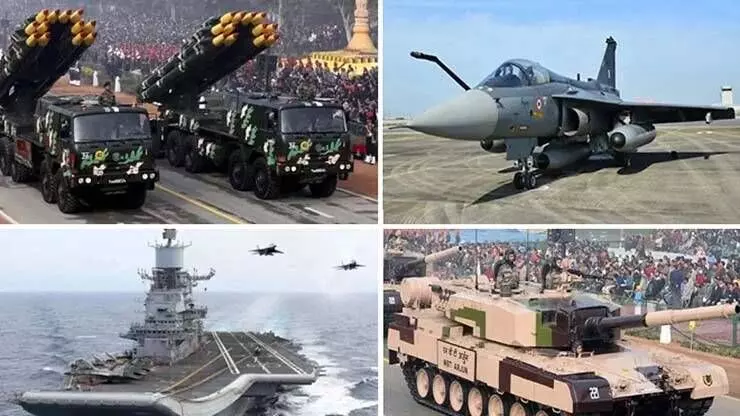India’s Geopolitical Defense Strategy: Redefining Power Through Strategic Alliances and Self-Reliance
India reshapes its defense strategy with self-reliance, global alliances, and Indo-Pacific focus to counter threats and boost strategic influence.
India’s Geopolitical Defense Strategy: Redefining Power Through Strategic Alliances and Self-Reliance

India's geopolitical defense strategy involves strengthening national security, fostering strategic partnerships, and promoting regional stability through a mix of military modernization, diplomacy, and economic development. This includes focusing on self-reliance in defense production, expanding its strategic reach in the Indo-Pacific region, and working with like-minded nations to address shared security challenges. India also aims to increase defense exports and foster partnerships with key countries like the US and France.
India's strategic objective was not war it was redefinition. By shifting the cost-benefit calculus of cross-border terrorism and signaling that every future provocation will invite asymmetric retaliation, Operation Sindoor has ushered in a new era in subcontinental geopolitics.
While the Russia-India defense partnership remains significant, India has actively diversified its defense sources to mitigate risks and access cutting-edge technologies. The United States has emerged as a key defense partner, with growing bilateral cooperation in areas such as intelligence sharing, counter-terrorism, and joint military exercises. India’s acquisition of advanced US defense systems, including C-17 Globemaster transport aircraft and AH- 64E Apache attack helicopters in May 2019, reflects this deepening engagement. According to the Stockholm International Peace Research Institute (SIPRI), the United States became the second-largest arms supplier to India between 2019 and 2023, accounting for 12% of India’s arms imports.
Similarly, India has strengthened its defense ties with the United Kingdom, France, and Israel. The UK has emerged as a significant partner in defense manufacturing and technology transfer, with joint ventures in areas like aircraft carrier construction and advanced jet engines. France has been a long-standing partner in defense, supplying Rafale fighter jets and collaborating on submarine development. Further, the 2016 Rafale deal, valued at approximately $8.8 billion, has significantly enhanced India’s air power capabilities. Israel, a key technology partner, has provided India with critical defense technologies, including missile systems and unmanned aerial vehicles. Israel has been a consistent supplier of advanced weaponry to India, with deals encompassing air defense systems, missiles, and electronic warfare systems.
According to SIPRI, India was the world’s largest arms importer between 2019–23, with Russia accounting for 34% of its arms imports, followed by France (15%) and Israel (11%). This data highlights the diversification trend, with non-Russian suppliers gaining a significant share of the Indian market.
India is today in the midst of a major geopolitical repositioning, as it discards its old non-aligned movement rhetoric, pursues a hard headed national interests based policy and builds stronger strategic ties with a wide range of countries including the United States and its allies in the region, especially Japan.
Former European colonial powers were not used to a former European colony defying sanctions that the US and Europe had slapped on Russia even though the Russia-Ukraine war was Europe’s war, not India’s
Putting the US in its place was next. India made it clear that Washington had no role to play in the ceasefire on May 10. The point was driven home clinically, frequently, and with undiplomatic candour by the Indian leadership.
Though still poor, India is now among the world’s top three nations across key domains: third largest passenger vehicles manufacturer, second largest steel producer, largest milk producer, largest software services exporter, second largest consumer market, and second largest mobile phone market.
Dealing with India requires a reset in Western and Chinese thinking. Both know they stand shamed by India’s progress. The West because India has risen without invading, colonising, shipping African slaves across an ocean, and settling on indigenous peoples’ land. These taint Western civilisation.

